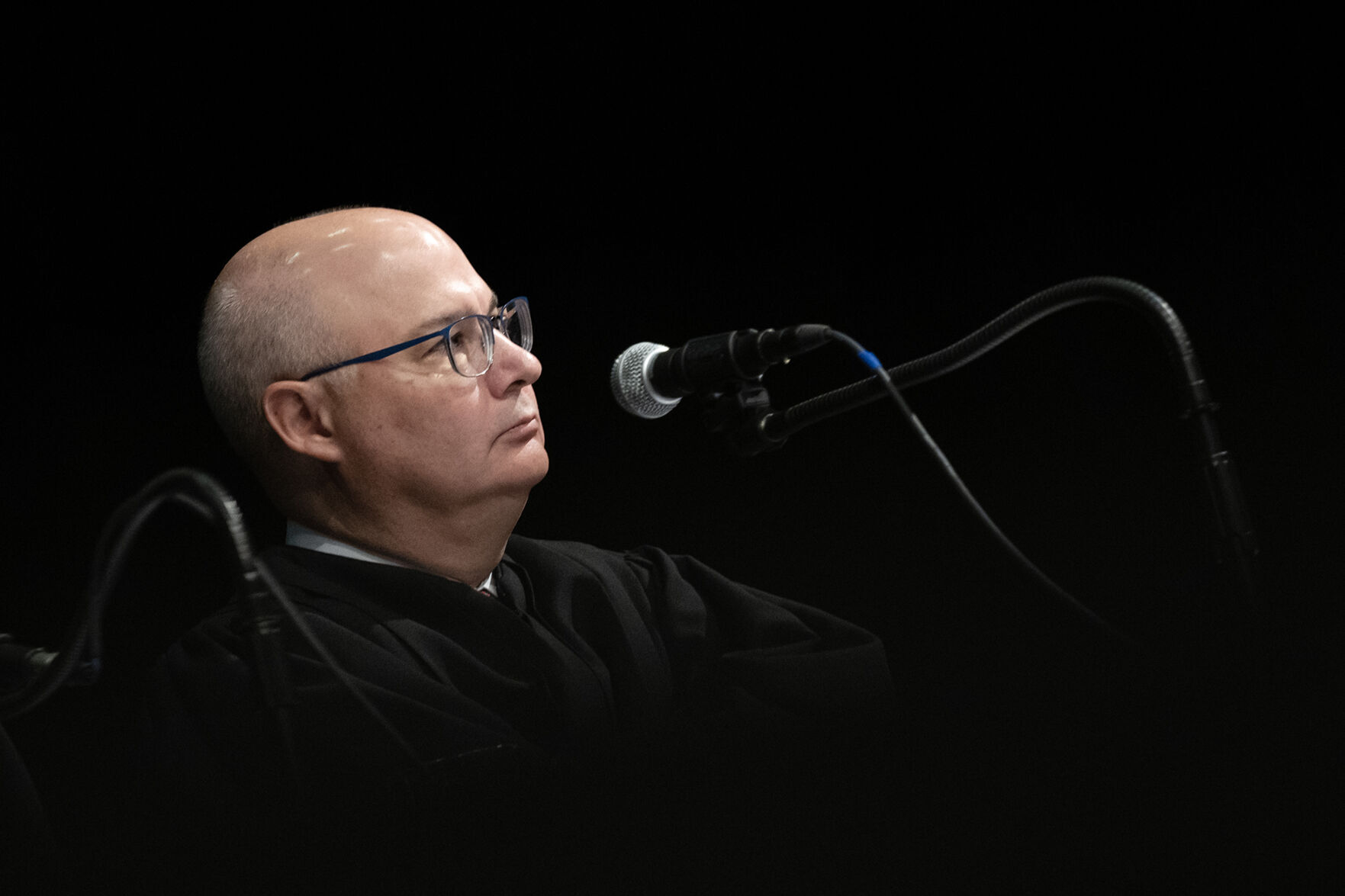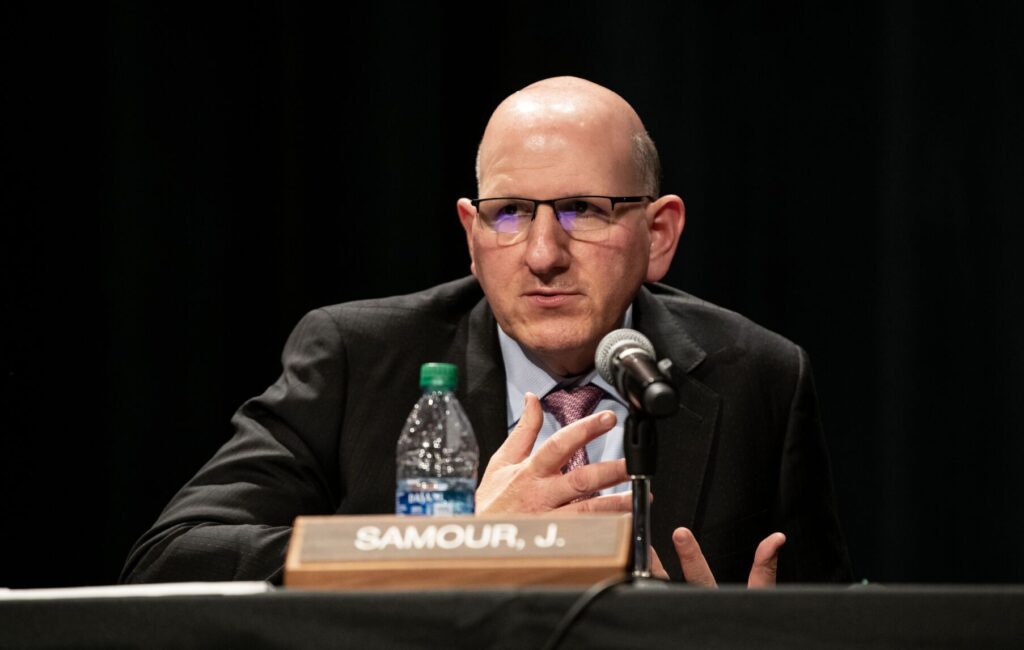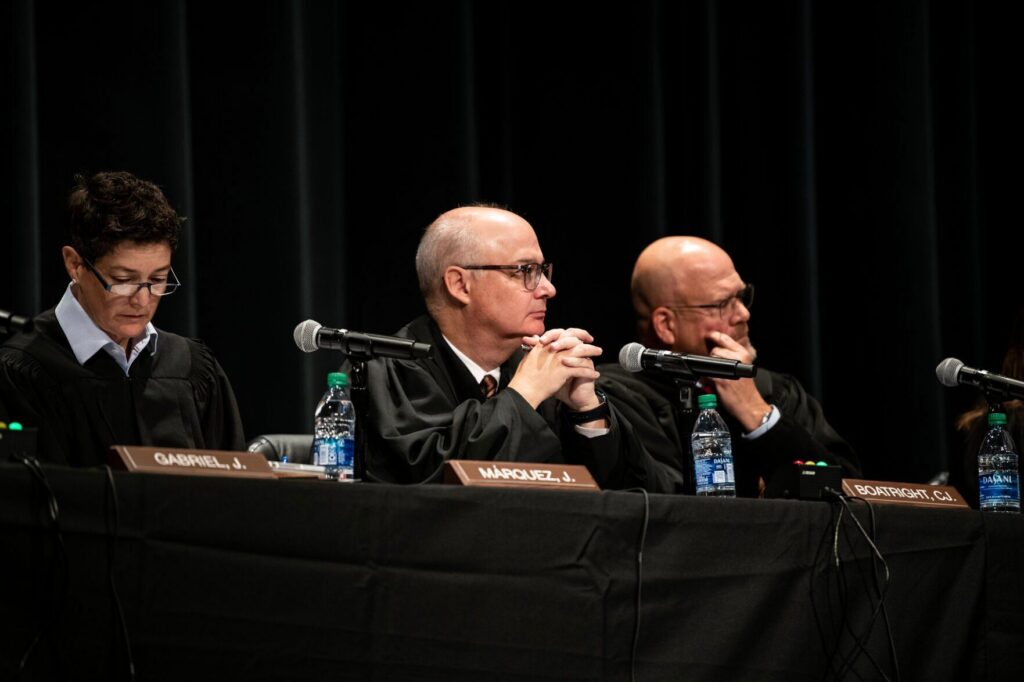Dissenting justices in Trump case raise due process concerns, offer slim details

When the Colorado Supreme Court decided, 4-3, on Tuesday that Donald Trump is constitutionally disqualified from the 2024 primary ballot because he engaged in insurrection, two of the dissenting justices voiced concerns about the former president’s right to due process.
“From my perspective, just because a hearing was held and (Trump) participated, it doesn’t mean that due process was observed,” wrote Chief Justice Brian D. Boatright.
“The decision to bar former President Donald J. Trump,” added Justice Carlos A. Samour Jr., “flies in the face of the due process doctrine.”
While both men – along with the third dissenting justice, Maria E. Berkenkotter – focused on procedural improprieties, it was unclear what, specifically, they wanted the disqualification proceedings to look like. For example, Samour envisioned more protections for Trump than in a civil case, but not “all the rights to which a defendant would be entitled in a criminal case.”
Attorneys familiar with the case observed that Trump had notice of the proceedings and an opportunity to be heard, which are the foundations of due process.
“It does not seem designed to offer as thorough a vetting as one would desire,” acknowledged Derek T. Muller, a professor at Notre Dame Law School. “At the same time, there were five days of a hearing, ample exhibits and evidence, opportunities to cross examine and more.”

Although the four Republican and two unaffiliated voters who brought the petition to bar Trump from the ballot questioned his constitutional eligibility under the 14th Amendment’s “insurrection clause,” Colorado’s election laws formed the vehicle for their case. Such proceedings are intentionally fast-tracked, and are the “exclusive method” under the law for elections challenges.
The four-justice majority that ordered Trump be blocked from the ballot in accordance with the 14th Amendment believed the proceedings before Denver District Court Judge Sarah B. Wallace afforded Trump due process. The five-day hearing, with more than a dozen witnesses – including several called by Trump – followed “extensive prehearing motions,” the majority noted.
Trump had argued to the Supreme Court that the underlying proceedings did not have “workable timeframes” or “well-established due process protections.”
Attorney Jason R. Dunn cautioned that Wallace was forced to adjudicate an unprecedented constitutional question within the existing guardrails.
“It’s not that the trial court necessarily did something wrong, it’s that there are no standards against which to judge whether it did,” said Dunn, Colorado’s U.S. attorney under Trump whose firm also submitted a brief on behalf of the Republican National Committee in the case. “Here, the judge had no choice but to build the airplane as she was flying it.”
Boatright’s brief dissent suggested Trump had “inadequate time to prepare” and complained about the deviations from the legal timelines, characterizing the petitioners’ case as inherently “too complex” to handle under the elections procedure.
Samour offered the more detailed critique of the process afforded to Trump. He noted Trump would have received the “full panoply of constitutional rights” had he been charged under the federal law criminalizing insurrection. At the same time, Samour admitted he was not advocating for that level of protection, given that disqualification under the 14th Amendment does not carry a criminal penalty.
“President Trump was not offered the opportunity to request a jury of his peers; experts opined about some of the facts surrounding the January 6 incident and theorized about the law,” he wrote, “and the court received and considered a partial congressional report, the admissibility of which is not beyond reproach.”
The report was that of the bipartisan U.S. House of Representatives committee that investigated the Jan. 6, 2021 attack on the U.S. Capitol and found Trump bore responsibility.

Colorado attorney Adam Mueller was unconvinced by the justices’ due process concerns, pointing out the dissents did not address whether disqualifying Trump from the ballot deprived him of life, liberty or property – a trigger for constitutional due process. Moreover, Wallace ultimately rejected the testimony of an expert who “theorized” the 14th Amendment applied to Trump in the first place.
“The thrust of Justice Samour’s argument is that the district court did not comply with the statutory deadlines in the election code,” he said. “Fair enough. But there’s no reasonable argument that the district court violated due process by being too deliberate and too careful. Due process is violated when proceedings go too fast, not the other way around.”
Frederick R. Yarger, the state’s solicitor general under former Republican Attorney General Cynthia Coffman, added that Trump faces multiple criminal indictments elsewhere. He called the dissenters’ views about fairness reasonable, given the contrast between those criminal proceedings and disqualification through Colorado’s elections laws.
“Election challenges in Colorado are designed to be fast paced and, unlike typical civil and criminal cases, they have limited procedures,” he said. “Chief Justice Boatright and Justice Samour appear concerned that a significant constitutional ruling like this one should come after the full procedures of a criminal trial or similar proceeding.”
Stan Garnett, the former elected district attorney for Boulder County who is now in private practice, believed the majority’s opinion disqualifying Trump was laid out “very carefully.” But he observed that all three dissenting justices served on the trial court bench prior to joining the state’s highest court.
“I do think the kinds of due process concerns they are raising are the things a trial judge worries about. Has everyone had a fair opportunity to develop the facts and to have these issues determined?” he said.
Despite the justices’ stated apprehension, law professor Aya Gruber of the University of Southern California remained unclear what their solution was.
“Tell me what procedure is exactly due,” she said.













